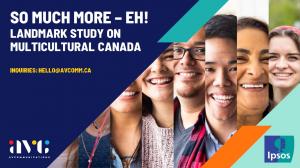
New Research Reveals Multicultural Values at Core of Canadian Identity as Federal Election Approaches
New Imperatives for Political Representation - 77% of Canadians View Cultural Diversity as Fundamental to National Identity
TORONTO, CANADA, March 31, 2025 /EINPresswire.com/ -- What does it mean to be Canadian in 2025?According to research from AV Communications (AVC) conducted by Ipsos Canada, it's about embracing multicultural values that span generations and communities – a sentiment that has profound implications for the upcoming federal election on April 28th. The "So Much More Eh - Multicultural Canada" study reveals that 77% of Canadians consider cultural diversity core to national identity, with younger and first-generation Canadians setting expectations for political representation and cultural authenticity.
"Our research shows that multicultural values aren't just important to new Canadians – they've become fundamental to how we define ourselves as a nation across generations," said Joycelyn David, Owner & CEO of AVC. "With an election just weeks away, these findings highlight a critical representation gap. While our population grows increasingly diverse, our political candidates need to reflect and be in tune with this reality in many ridings."
Key Findings with Implications for Political Leaders:
• Cross-Generational Impact: Cultural diversity spans beyond first-generation Canadians, with second-generation Canadians (46%) showing the highest rates of cross-cultural relationships thus emerging as crucial bridges between communities
• Youth Representation is Evolving 54% of Gen Z Canadians predominantly identify as not White, compared to just 22% of Boomers, signaling a potentially massive shift in the voting landscape
• Cultural Pride & National Identity: 83% of Canadians feel comfortable expressing their cultural identity while feeling part of Canadian society, a figure that echoes the proportion of Canadians who claim pride in being Canadian.
• Demand for Authentic Representation: 74% of Canadians acknowledge advertising's role in shaping cultural perceptions, but 51% feel representation often lacks authenticity – highlighting the need for political representatives to address this discrepancy in order to be seen as genuine and relatable to their constituents.
• Expectation for Organizational Leadership: 64% believe brands have a responsibility to create a unified multicultural society. This finding can be extended to organizations in general, including political entities. It suggests that the public increasingly expects leaders across various sectors, including the political sphere, to play a role in fostering social cohesion and inclusivity.
The data comes at a pivotal moment as Canadians prepare to vote in a federal election where representation and inclusivity are emerging key issues. The study indicates that any institution or organization, including political parties, may find stronger resonance with voters across generations if their candidates and platforms authentically reflect Canada's multicultural reality.
"This research challenges the outdated notion that cultural diversity is a niche concern limited to specific communities," continued David. "With 86% of Gen Z actively engaging with international content and 65% of Millennials doing the same, we're witnessing a new era of global cultural connectivity that's reshaping voter priorities and expectations."
Looking Ahead: Potential Electoral Implications
The study points to several trends that can be leveraged to appeal to a wider base of Canadians:
1. Growing electoral influence of second-generation Canadians who bridge cultural communities, as the share of second-generation Canadians is posed to increase in the future
2. Increasing importance of authentic cultural representation in political campaigns and platforms
3. Evolution of Canadian identity through intergenerational cultural exchange
4. Rising expectation for multilingual political outreach across platforms
5. Growth in cross-cultural political engagement
About AV Communications (AVC)
Founded in 2003, AVC is driven by a mission to create a more inclusive future, shaping the way brands connect with multicultural audiences globally. Guided by a vision to become a leading independently owned marketing network powered by diversity, AVC strives to push boundaries and set new standards for multicultural mass marketing in the industry. Serving notable brands such as Arbor Financial, ABS-CBN, BMO Financial, Canon, Cadillac Fairview, DIAGEO, and Western Union. AVC was also recently recognized as Top Growing Company by Globe and Mail and Finalist for “Small Business of the Year” with the Canadian Aboriginal and Minority Supplier Council (CAMSC). Learn more at www.avcomm.ca or follow on LinkedIn.
About Ipsos
Ipsos is one of the largest market research and polling companies globally, operating in 90 markets and employing nearly 20,000 people. Our passionately curious research professionals, analysts and scientists have built unique multi-specialist capabilities that provide true understanding and powerful insights into the actions, opinions and motivations of citizens, consumers, patients, customers or employees. Our 75 business solutions are based on primary data from our surveys, social media monitoring, and qualitative or observational techniques.
About the Research
The online survey was developed by AVC and conducted by Ipsos between August 9th and 20th, 2024. It includes responses from 1,795 Canadian ages 18+, with quotas on age, gender, and region, born in Canada vs. those who immigrated, as well as generational status in Canada. Ipsos captured a diverse sample of ethnic, racial, and cultural backgrounds including boosts/oversamples of the largest “visible minority” groups and those who immigrated in the past 10 years to ensure a sufficient minimum sample size for reliable analysis. Quotas and weighting were employed on all the above characteristics to ensure that the sample’s composition reflects that of the Canadian population according to census parameters. The credibility interval for a sample of this size is ±2.8 percentage points, 19 times out of 20.
Tonia Au
AV Communications Inc.
+1 416-866-8882
avcmedia@avcomm.ca
It's Time to Talk Canada
Distribution channels: Business & Economy, Companies, Culture, Society & Lifestyle, Politics, World & Regional
Legal Disclaimer:
EIN Presswire provides this news content "as is" without warranty of any kind. We do not accept any responsibility or liability for the accuracy, content, images, videos, licenses, completeness, legality, or reliability of the information contained in this article. If you have any complaints or copyright issues related to this article, kindly contact the author above.
Submit your press release
